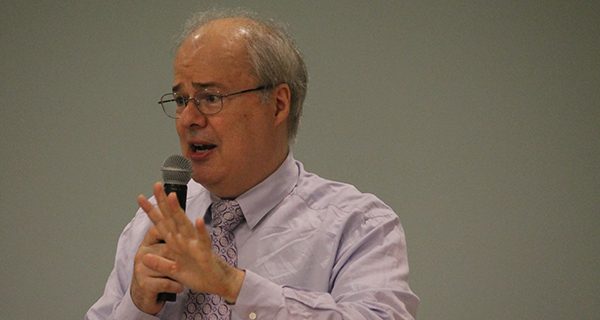[ccfic caption-text format="plaintext"]
By James Kinneen
Hometown Weekly Reporter
Justin Locke, a double bass player who has performed with groups like The Boston Pops and The Boston Symphony Orchestra, as well as being the author of “Real Men Don't Rehearse: Adventures in the Secret World of Professional Orchestras,” brought his unique blend of humor and folk wisdom to the Tolles Parsons Center on Thursday, regaling the crowd with a wide variety of stories about his time in the world of professional orchestras.
The book’s title is not a suggestion, but a comment he was once told by a veteran orchestra member when he questioned how little they were practicing incredibly difficult works like “The Sorcerer’s Apprentice” before they had to play them. Locke felt this comment best exemplified the sometimes over-the-top machismo that permeates the orchestra scene.
His journey to this underground world was a rather atypical one, as Locke comes from a farm just outside of Toledo, Ohio. When his mother wanted to spend more time with an extremely handsome orchestra conductor that noted the band needed a bass player, “magically, as broke as we were, one day, a string bass appeared in our living room.”
This journey would lead him to the New England Conservatory of Music, then to the Pops and Boston Symphony Orchestra, where he would work under legends like John Williams, Keith Lockhart and Arthur Fiedler. Under Fiedler, Locke played the famous 1976 Bicentennial Concert that was so crowded, Storrow Drive had to be shut down. After being escorted by motorcycle police to the show, which involved using the jaws of life to cut a hole thought the fence, Locke took a wrong turn and ended up on stage in front of the record-setting crowd, all by himself.
“These people had been waiting in 95 degree heat all day, waiting for something - anything - to happen, when all of a sudden, I’m the only one on stage. They were staring at me, I was staring at them, and I didn’t know what else to do, so I waved. I got the biggest standing ovation ever when I did that.”
Under Williams, Locke got a free trip to Japan after promoters saw his show in Boston and loved it so much, they wanted to bring it to their country.
But Williams is a quiet, reserved man, and Japanese crowds tend to be reserved, as well. As a result, Williams didn’t want any bass spins in his show. But one day, Locke was accosted for not having them; the Japanese hosts wanted the show to be just like it had been in Boston. Unsure of how to handle the situation, Locke put a spin into “76 Trombones.” The Japanese crowd went insane, and John Williams looked at him with a sad, defeated face.
Locke’s storytelling is tremendous, and more than entertaining enough to carry a book, whether you’re a music fan or not. While the world of symphony orchestras is thought of as being stuffy and pompous, Locke showed everyone at the Tolles Parsons Center that there’s plenty going on behind the scenes that people don’t know about - unless, of course, you read his book.





















